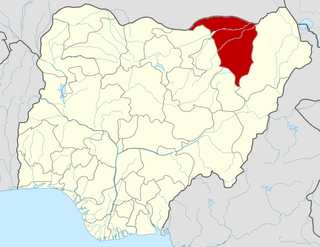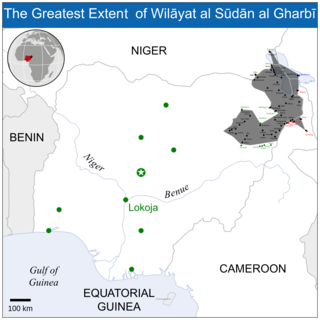Related Research Articles

Maiduguri is the capital and the largest city of Borno State in north-eastern Nigeria, on the continent of Africa. The city sits along the seasonal Ngadda River which disappears into the Firki swamps in the areas around Lake Chad. Maiduguri was founded in 1907 as a military outpost by the British Empire during the colonial period. As of 2022, Maiduguri is estimated to have a population of approximately two million people, in the metropolitan area.

Boko Haram, officially known as Jamā'at Ahl as-Sunnah lid-Da'wah wa'l-Jihād, is an Islamist terrorist jihadist organization based in northeastern Nigeria, which is also active in Chad, Niger, northern Cameroon, and Mali. In 2016, the group split, resulting in the emergence of a hostile faction known as the Islamic State's West Africa Province.

Gwoza is a local government area of Borno State, Nigeria. Its headquarters are in the town of Gwoza, a border town "about 135 kilometres South-East of Maiduguri." The postal code of the area is 610.
Fotokol is a town and commune in Logone-et-Chari Department, Far North Region, Cameroon. It is home to Fotokol High School.

The Boko Haram insurgency began in July 2009, when the militant Islamist and jihadist rebel group Boko Haram started an armed rebellion against the government of Nigeria. The conflict is taking place within the context of long-standing issues of religious violence between Nigeria's Muslim and Christian communities, and the insurgents' ultimate aim is to establish an Islamic state in the region.

The Yan Tatsine was a militant Quranist movement founded by the controversial Nigerian leader Maitatsine that first appeared around the early 1970s.

Abu Mohammed Abubakar al-Sheikawi was a Nigerian militant who was the leader of Boko Haram, an Islamist extremist organization based in northeastern Nigeria, from 2009 to 2021. He served as deputy leader to the group's founder, Mohammed Yusuf, until Yusuf's execution in 2009.
Timeline of the Boko Haram insurgency is the chronology of the Boko Haram insurgency, an ongoing armed conflict between Nigerian Islamist group Boko Haram and the Nigerian government. Boko Haram have carried out many attacks against the military, police and civilians since 2009, mostly in Nigeria. The low-intensity conflict is centred on Borno State. It peaked in the mid-2010s, when Boko Haram extended their insurgency into Cameroon, Chad and Niger.
The Konduga massacre took place in Konduga, Borno State, Nigeria on 11 February 2014. The massacre was conducted by Boko Haram Islamists against Christian villagers. At least 62 people were killed.

On February 25, 2014, fifty-nine boys were killed at the Federal Government College of Buni Yadi in Yobe State, Nigeria. The twenty-four buildings of the school were also burned down as a result of the attack. No group has claimed responsibility for the attack, but according to media and local officials the Islamist militants Boko Haram are suspected to be behind the attack.

On the night of 14–15 April 2014, 276 mostly Christian female students and also Muslim students aged from 16 to 18 were kidnapped by the Islamic terrorist group called Boko Haram from the Government Girls Secondary School at the town of Chibok in Borno State, Nigeria. Prior to the raid, the school had been closed for four weeks due to deteriorating security conditions, but the girls were in attendance in order to take final exams in physics.
As of 31 August 2020, Cameroon hosted a total refugee population of approximately 421,700. Of these, 280,500 were from the Central African Republic, driven by war and insecurity. In the Far North Region, Cameroon hosts 114,300 Nigerian refugees, with the population sharing their already scarce resources with the refugees.
Amchide is a town in Cameroon, on the border with Nigeria. It abuts the Nigerian town of Banki, with streets and even houses straddling the border.

Religious violence in Nigeria refers to Christian-Muslim strife in modern Nigeria, which can be traced back to 1953. Today, religious violence in Nigeria is dominated by the Boko Haram insurgency, which aims to establish an Islamic state in Nigeria. Since the turn of the 21st century, 62,000 Nigerian Christians have been killed by the terrorist group Boko Haram, Fulani herdsmen and other groups. The killings have been referred to as a silent genocide.
The following lists events from 2014 in Nigeria.
Limani is a town in the Far North Region of Cameroon, on the border with Nigeria.
The 2015 Baga massacre was a series of mass killings carried out by the Boko Haram terrorist group in the north-eastern Nigerian town of Baga and its environs, in the state of Borno, between 3 January and 7 January 2015.
The following lists events that happened during 2012 in Nigeria.

Starting in late January 2015, a coalition of West African troops launched an offensive against the Boko Haram insurgents in Nigeria.
The 2015 Chad suicide bombings were a suicide attack which occurred the afternoon of Saturday 10, October 2015 in the town of Baga Sola, Chad, a small fishing community on Lake Chad. The attack was allegedly perpetrated by the Nigeria-based Islamic extremist group Boko Haram and resulted in the deaths of around 36 individuals, and wounded upwards of 50 more. The attacks were reportedly carried out by two women, two children, and a man with the intended targets being a busy marketplace, and a nearby refugee camp hosting tens of thousands of Nigerians. It was the deadliest attack to take place in the Lake Chad region.
References
- ↑ "About us". National Orientation Society. Retrieved 2015-01-06.
- ↑ Abubakar Yakubu (2009-09-02). "Nigeria: NOA, FCT Communities Interact on Health Issues". Daily Trust - allAfrica.com. Retrieved 2015-01-06.
- ↑ "NGP KYG: Dr Mike Omeri". Nigerian Governance Project. Retrieved 2015-01-06.
- ↑ Elayo, Mark (2014-07-13). "The homeboy, Mike Omeri, @ 50". Vanguard News. Retrieved 2015-01-06.
- ↑ Ahmad, Romoke W. "Nigeria: Keep Faith With Nigeria - Omeri". Daily Trust - allAfrica.com. Retrieved 2015-01-06.
- ↑ Concord Team. "Nigerian Government Angers Cameroon Public Opinion As Decision To Rehabilitate Boko Haram Militants Is Made Public In Abuja". Cameroon Concord - Cameroon Intelligence Report. Archived from the original on 2015-01-06. Retrieved 2015-01-06.
- ↑ "Over 2000 'Repentant' Boko Haram Terrorists Graduate From Nigerian Government Programme, Return To Communities | Sahara Reporters". saharareporters.com. Retrieved 2023-05-14.